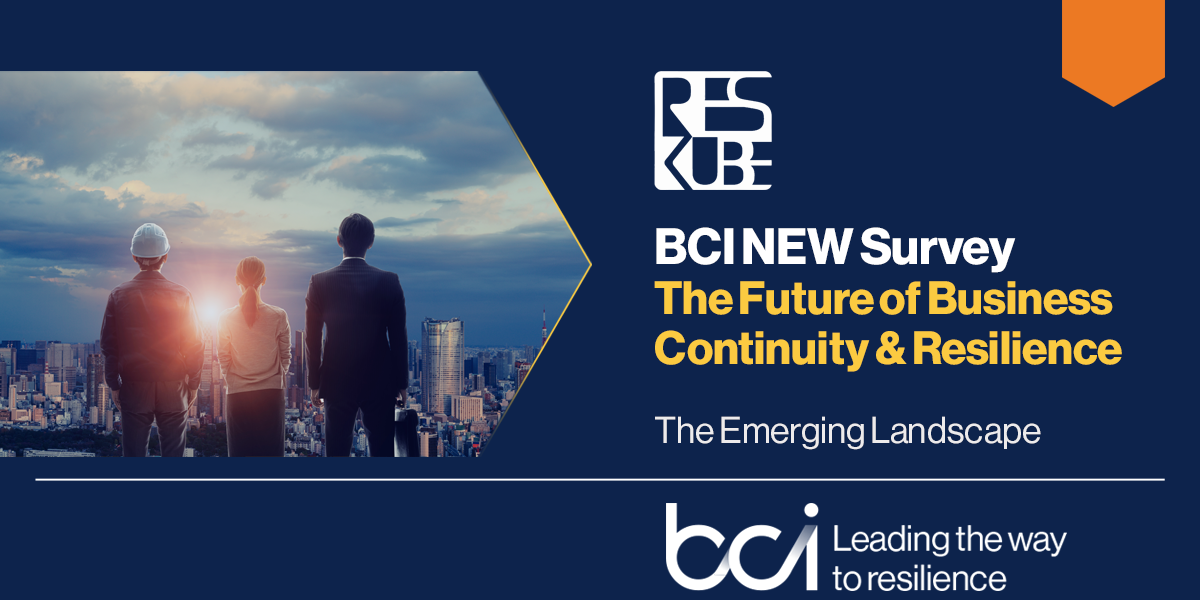
Reskube Sponsors The Future of Business Continuity & Resilience BCI Report
This is the second time we have looked back at the pandemic.
The first time around we thought we had learned the lessons to adapt to the way the world had changed. This report shows us, a year further on and still in the grips of the pandemic, that the world and our profession within it has changed yet further.
We are very pleased to be partnering with the BCI to deliver this report on a global survey charting this change and our response as professionals and as organisations.
The pandemic has affected us for much longer than we were anticipating when we first ran this survey. We can now see that many of the changes to the way we work and to how we run our organisations will remain with us into the future.
This report shows that, as a consequence of the benefits seen over the past 18 months, there is now a greater appreciation of Business Continuity at board level and more widely in our organisations. However, some of the anticipated cross-silo collaborations have yet to materialise. Business Continuity has been given a more strategic position in management minds, however, and is seen as a competitive advantage.
The past year has seen the temporary shift to homeworking become fixed in our psyches. A McKinsey Study – Reimagine Work – showed that most people wanted to continue working from home for 3 days a week after the pandemic. A further survey by EY in April 2021 showed that nine in ten respondents want flexibility in where and when they work and 54% will consider moving job if they are not given it.
This move to hybrid working has meant that we, as service providers, have had to adapt fast.
For example, this report shows how many were frustrated with restrictions in the Work Area Recovery (WAR) services that prevented their use for split working. These restrictions were necessary to manage customers’ service risk but did not take the pandemic scenario into account. We need to develop more flexible services for the future.
The respondents in the report have asked us to innovate and develop relevant and flexible WAR services that assist at times of cyber-attack. We are also asked to develop services that help provide resilience to homeworking staff.
Aside from pandemic and cyber-attack, natural disasters feature prominently in our minds, because of the multitude of major storm, extreme heat, extreme cold and wildfire events that we have seen in recent months.
However, these dramatic and devastating events are thankfully rare. We must build resilience to cope with the daily interruptions to power and to communications that more frequently affect our newly hybrid workforce.
As infrastructure is adapted to support the hybrid worker, security and resilience provisions must be integral to our daily operations to reduce our organisational risk.
The UK is seen to deliver relatively stable power and internet to homes. However, a USwitch report published in July showed that 14.8 million UK homes were interrupted by a significant loss of internet, often caused by power cut, over the preceding year. This had an estimated impact of £5 billion loss to UK businesses. These events, along with the on average 80 major power cuts every day across the country, demonstrate that we still need to consider our critical homeworkers resilience.
This report shows that 52.7% of respondents have not yet begun looking at homeworker resilience but will do soon.
Some are using the office as fallback for the homeworker, flipping the old ways on their head. This is “disaster recovery” provision rather than true resilience, however.
As ResKube, we find that 5-10% of homeworking staff fall into a category that requires true power and communications resilience in the home. This is to ensure that critical work or decision-making are not interrupted and that time critical work is completed on schedule. It is for these employees that we have developed the ResKube solution.
I hope that you find this report a valuable insight into the views of your industry peers from around the world, giving you an understanding of the key lessons learned from yet another eventful year.